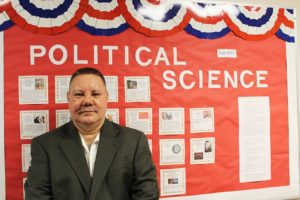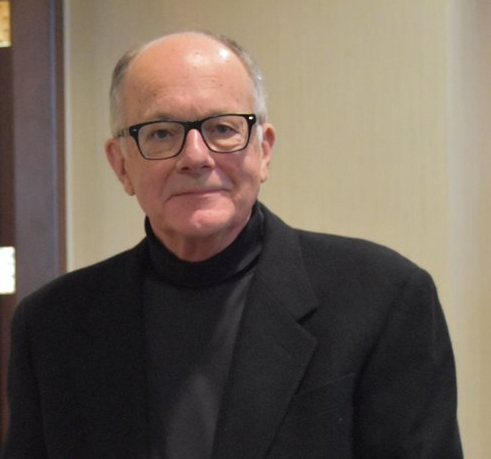
Michael Rudar, a Duquesne philosophy professor since 2006, will be making the switch to the Political Science department this year.

Michael Rudar, a Duquesne philosophy professor since 2006, will be making the switch to the Political Science department this year.
Kailey Love | Photo Editor
With all the political division that has been the central focus of debate in the U.S. this year, Michael Rudar, a professor of philosophy at Duquesne who will be teaching courses in the Political Science department this year, believes it is time we return to the basics.
Describing himself as a Pittsburgh native, Rudar grew up in the South Hills and attended Slippery Rock University for his undergraduate education. He went on to receive both his Masters and PhD in philosophy at Duquesne, where he has been teaching since 2006.
While he usually teaches four classes per year in the philosophy department, Rudar will lend his philosophical knowledge to the Political Science Department and teach both Western Political Thought 1 and 2 while Charles Rubin, who normally leads both classes, is on a year long research leave at Princeton University.
“When I was asked to do it, I was elated,” Rudar said. “With political science and political philosophy, there’s a lot of overlap, but there are some differences.”
He described these differences as how government works — such as how laws are created and put into practice, how committees function and the other basic mechanics that fuel government — versus why government works. He believes that without understanding the fundamentals of the second, you cannot understand the mechanics of the first, and plans to make that a central point of discussion throughout the courses.
“We should all know our history of America, our Founding Fathers, how a bill becomes a law … all of that stuff is very important. But what you really need are these initial first questions,” he said.
Though his area of expertise has always been philosophy as a whole and its history, Rudar believes that political philosophy is an important, not just for those who study philosophy or political science, but for everyone.
“To me, there is never a time where political philosophy is not necessary. One of the misconceptions about political philosophy, or just philosophy in general, is that it doesn’t have anything to do with the real world. Not only is that not true, it has everything to do with the real world … it affects our lives, not just materially, but the life we’re living in general.”
Another large focus in his class will be studying the entirety of Plato’s Republic and how it is still reflected in society in modern times, which Rudar said he was “excited beyond belief to be able to do that this semester.”
“A lot of people think there’s no relevance, why do I have to study other people in Ancient Greece? Because they’re talking about the same things we’re talking about today,” Rudar said.
When asked about the current political climate in relation to studying political philosophy and understanding the basis on which our government is built, he believes that perhaps “now could be a time when we really need it,” and that too many people are looking at politics “too narrowly,” right now, focusing only on the mechanics without looking through a larger lense at the big picture.
“We are, as Aristotle said, a political animal. And really, politics should involve everybody…it has to do with how we organize ourselves as a people,” Rudar said. “Everybody should want to be involved with [politics]…everybody should be given a voice in that. It’s not just the privilege of a small group of people that are powerful. Everybody, if they’re doing so responsibly, should have a voice in the political community.”




